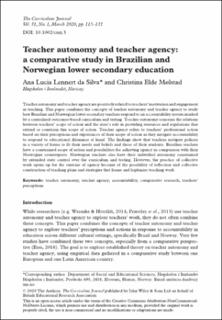Teacher autonomy and teacher agency: a comparative study in Brazilian and Norwegian lower secondary education
Peer reviewed, Journal article
Published version

Åpne
Permanent lenke
https://hdl.handle.net/11250/2731372Utgivelsesdato
2020Metadata
Vis full innførselSamlinger
Sammendrag
Teacher autonomy and teacher agency are positively related to teachers’ motivation and engagement in teaching. This paper combines the concepts of teacher autonomy and teacher agency to study how Brazilian and Norwegian lower secondary teachers respond to an accountability system marked by a centralised outcomes-based curriculum and testing. Teacher autonomy concerns the relations between teachers’ scope of action and the state’s role in providing resources and regulations that extend or constrain this scope of action. Teacher agency refers to teachers’ professional action based on their perceptions and experiences of their scope of action as they navigate accountability to respond to educational dilemmas at hand. The findings show that teachers navigate policies in a variety of forms to fit their needs and beliefs and those of their students. Brazilian teachers have a constrained scope of action and possibilities for achieving agency in comparison with their Norwegian counterparts. Norwegian teachers also have their individual autonomy constrained by extended state control over the curriculum and testing. However, the practice of collective work opens up for the exercise of agency because of the possibility of reflection and collective construction of teaching plans and strategies that frame and legitimise teaching work
Beskrivelse
© 2020 The Authors. The Curriculum Journal published by John Wiley & Sons Ltd on behalf of British Educational Research Association.
Tidsskrift
Curriculum Journal
Med mindre annet er angitt, så er denne innførselen lisensiert som Attribution-NonCommercial-NoDerivatives 4.0 Internasjonal
Beslektede innførsler
Viser innførsler beslektet ved tittel, forfatter og emneord.
-
Teacher collaboration: A study of topics in planning sessions between a science and a bilingual teacher
Dewilde, Joke Ingrid (Chapter, 2009)The education of recently-arrived language minority pupils involves subject teachers, second language teachers and bilingual teachers. Even though these teachers collaborate in one or other way, these relationships have ... -
TEACHERS AS LEARNING GAME DESIGNERS: CAN ELEMENTARY SCHOOL TEACHERS WITH NO BACKGROUND REALLY GAMIFY THEIR OWN TEACHING?
Nordby, Anders; Nordseth, Hugo (Journal article; Peer reviewed, 2016)Yes, they can! This presentation gives some examples from a project where ordinary elementary school teacher’s design and implement games for their own teaching. Their assignment was simple - develop and implement a pervasive ... -
Teacher Nominations of Preschool Children at Risk for Mental Health Problems: how False Is a False Positive Nomination and What Make Teachers Concerned?
Stensen, Kenneth; Lydersen, Stian; Stenseng, Frode; Wallander, Jan Lance Anders; Drugli, May Britt (Peer reviewed; Journal article, 2021)Identification attempts in populations with a low prevalence of problems usually result in a considerable number of false positives. Thus, the aim of the current study was to investigate the false positive rate following ...
